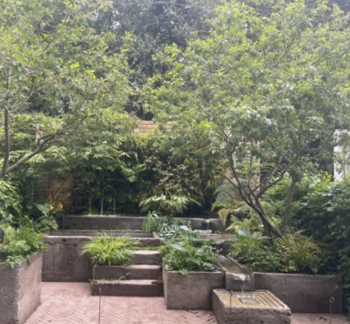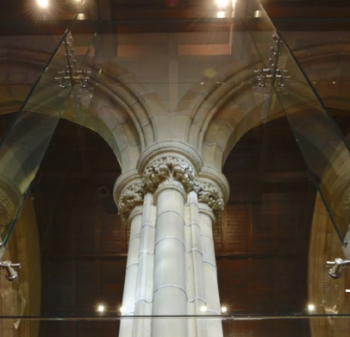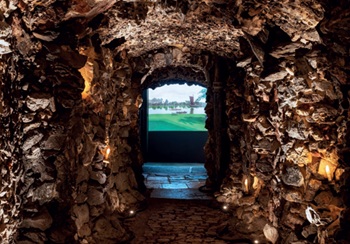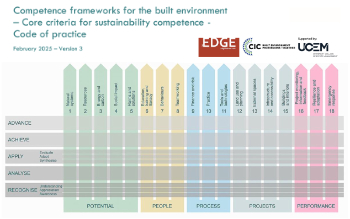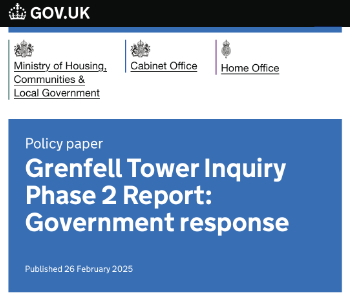BREEAM Retail prize 2016
In June 2016, the top prize in the retail in-use category at the BREEAM global sustainability awards went to the Kanyon Centre, in the Levant business district of Istanbul.
The mixed-use property development measuring 40,812 sq.m, encompasses a 25-storey business tower offering 30,000 sq.m of office space, a 40,000 sq.m open-air shopping area with 157 boutiques, restaurants, cafes, bars, a cinema, health and fitness centre, gourmet market and an outdoor performance area. The centre attracts 35,000 visitors daily. A residential block includes 179 apartments.
Kanyon was the first project to achieve an ‘Excellent’ rating on its BREEAM In-Use certificate in Turkey in 2012, reflecting its long-term commitment to sustainability and innovative performance. In June 2015, Kanyon achieved Turkey’s first ‘Outstanding’ rating on its BREEAM In-Use for International building management, a reflection of its best practice policies.
Kanyon is a joint venture between Eczacba Pharmaceutical and Industrial Investment and Real Estate Investment Trust. Several international companies were involved in the $200 million project, including Jerde Partnership, Tabanlolu Architects, Arup Engineering and Tepe Construction.
From the outset, the developers specified technologies that would direct the centre towards a sustainable and environmentally-responsible future:
- An intelligent building management system (BMS) monitors, controls and optimises energy and water consumption. Space heating, cooling, fans, humidification, lighting and small power systems are constantly monitored.
- 35% of the building’s hot water demand is provided by solar panels. A co-generation system serves 10% of the heating demand and by installing a heat recovery system in fresh air units, a 4% reduction in energy consumption has been achieved.
- The open-air structure provides maximum use of daylighting, and allows visitors to enjoy fresh air and landscaping.
- Rainwater and greywater are collected for use in public toilets and landscape irrigation.
- Internal and external lighting meet best practice levels with most fixtures changed to LEDs.
- CO2 detectors monitor indoor environmental quality.
- Kanyon operates its own waste management system with collection points for glass, paper and other recyclable materials, waste food from restaurants and cafes, and electronic waste.
Tuncer Kinikili, Operation Director of Kanyon Facilities Management and Marketing, said: “Kanyon aimed to be a pioneer in both the reduction of energy usage, water consumption and waste management, via an innovative and comprehensive management strategy to minimise its carbon footprint. As a result of our investment the centre is achieving an 11% annual saving in energy costs. And as a consequence of our BREEAM success we’re seeing employees and tenants participating more and more in sustainable activities.”
This article was written by Simon Guy for BRE Buzz and published 20 June 2016. For more information, see BRE Buzz
--BRE Buzz
[edit] Find out more
[edit] Related articles on Designing Buildings Wiki
- Articles by BRE Buzz on Designing Buildings Wiki.
- BREEAM.
- BREEAM and CEEQUAL.
- BREEAM and retail.
- BREEAM In-Use International.
- BREEAM puts the emphasis on green retail.
- BREEAM value increases while costs reduce.
- Do green buildings pay?
- Leadership in Energy and Environmental Design.
- SMARTWaste Case Study Interview: Canary Wharf Contractors Limited.
Featured articles and news
Microcosm of biodiversity in balconies and containers
How minor design adaptations for considerable biodiversity benefit.
CIOB student competitive construction challenge Ireland
Inspiring a new wave of Irish construction professionals.
Challenges of the net zero transition in Scotland
Skills shortage and ageing workforce hampering Scottish transition to net zero.
Private rental sector, living standards and fuel poverty
Report from the NRH in partnership with Impact on Urban Health.
.Cold chain condensing units market update
Tracking the evolution of commercial refrigeration unit markets.
Attending a conservation training course, personal account
The benefits of further learning for professsionals.
Restoring Alexander Pope's grotto
The only surviving part of his villa in Twickenham.
International Women's Day 8 March, 2025
Accelerating Action for For ALL Women and Girls: Rights. Equality. Empowerment.
Lack of construction careers advice threatens housing targets
CIOB warning on Government plans to accelerate housebuilding and development.
Shelter from the storm in Ukraine
Ukraine’s architects paving the path to recovery.
BSRIA market intelligence division key appointment
Lisa Wiltshire to lead rapidly growing Market Intelligence division.
A blueprint for construction’s sustainability efforts
Practical steps to achieve the United Nations Sustainable Development Goals.
Timber in Construction Roadmap
Ambitious plans from the Government to increase the use of timber in construction.
ECA digital series unveils road to net-zero.
Retrofit and Decarbonisation framework N9 launched
Aligned with LHCPG social value strategy and the Gold Standard.
Competence framework for sustainability
In the built environment launched by CIC and the Edge.
Institute of Roofing members welcomed into CIOB
IoR members transition to CIOB membership based on individual expertise and qualifications.
Join the Building Safety Linkedin group to stay up-to-date and join the debate.
Government responds to the final Grenfell Inquiry report
A with a brief summary with reactions to their response.









